16 Impactful CSR Statistics Charitable Companies Should Know
The top companies know that sales are no longer everything. Employees, consumers, and investors want to know that businesses are committed to making the world a better place in their everyday operations. That’s where corporate social responsibility (CSR) comes in.
CSR encompasses a company’s efforts to contribute to society, from corporate philanthropy to environmental advocacy. Since CSR refers to various programs and initiatives, it can be difficult to conceptualize its impact and how companies should approach it.
To illustrate the multi-faceted nature of CSR, we’ve compiled a list of 16 helpful CSR statistics. This data will show the necessity of adopting CSR and which methods companies should use. Let’s dive into it!
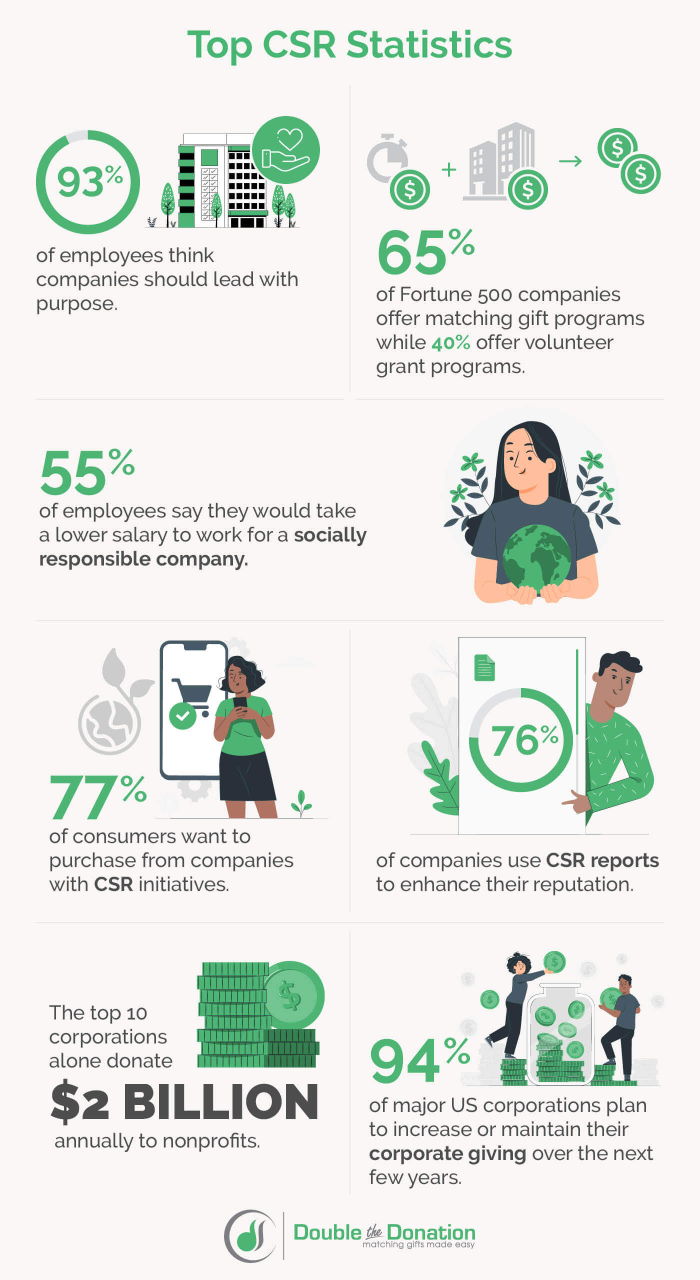
1. 93% of employees think companies should lead with purpose.
When employees come to work each day, they want to feel like they’re making a difference. Even if their jobs don’t directly affect those in need, employees take comfort in knowing that the companies they work for use their revenue and team time for good.
Make sure your employees are up to date with your company’s CSR initiatives. Consider sending monthly or quarterly updates about steps your business is taking to make the world a better place. Your team will take pride in knowing their employer is committed to improving society and your local community.
2. 71% of employees think it’s important to work at a company that gives back through philanthropy and volunteering.
More specifically, employees want to get involved in your CSR efforts. The two easiest ways for them to do so are corporate giving and volunteering.
When you start a corporate giving program, you show employees that you care about their interests and want to work together to give back to the causes they’re passionate about. There are a variety of different elements your corporate giving program may include, such as:
- Matching gifts. Many companies will match employee donations to their nonprofit of choice, typically at a 1:1 ratio.
- Volunteer grants. To incentivize employee volunteering, companies may contribute to nonprofits based on the number of hours their employees volunteer.
- Fundraising matches. Instead of matching employee donations, fundraising matches apply to funds individual employees raise for walkathons, runs, or other events.
- Community grants. Nonprofits can apply for grants offered by companies in areas such as disaster relief.
- Annual giving campaigns. Companies may run specific fundraising campaigns during the end of the year or dedicated giving days.
- Automatic payroll deductions. With automatic payroll deductions, employees can easily donate to their favorite causes on a regular basis.
- Annual grant stipends. While annual grant stipends are somewhat rare, some companies distribute a predetermined amount of money to employees each year for them to donate to their nonprofits of choice.
- Internal employee fundraising. Nonprofits and companies alike may rely on their team members to raise money for worthy causes.
- Scholarships. Businesses may help students pay for tuition, living expenses, food, and other associated costs.
- Sponsorships. For nonprofits hosting events, corporate sponsorships can be very helpful in securing necessary funding. Additionally, these nonprofits may promote and publicly thank their corporate sponsors, allowing businesses to gain positive publicity.
To ensure your employees understand how your program works, create a corporate charitable giving policy that outlines your program’s components and requirements. For example, you may limit donations through automatic payroll deductions to only environment-oriented nonprofits if sustainability is your company’s primary focus.
In terms of volunteering, you can encourage your employees to participate by developing a formal corporate volunteer program. Reach out to local nonprofits to line up volunteer opportunities for your team. You may also survey your employees to find which organizations they already volunteer with and organize volunteer events with those nonprofits.
3. 65% of Fortune 500 companies offer matching gift programs while 40% offer volunteer grant programs.
The two most popular forms of corporate giving are matching gifts and volunteer grants. Matching gifts occur when an employee contributes to a nonprofit, and their employer matches that donation. While most companies match employee donations at a 1:1 ratio, some may match at a 2:1 or 3:1 ratio.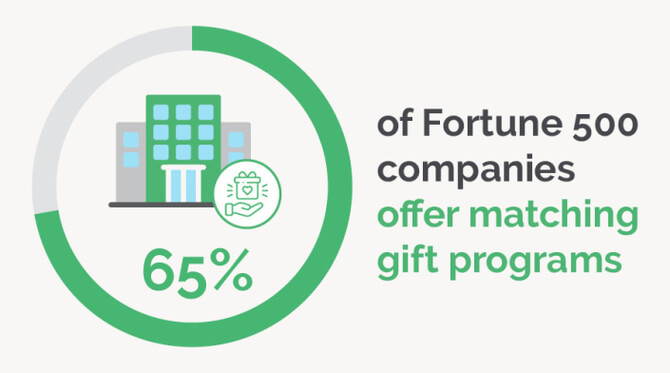
No matter the matching ratio your company decides upon, matching gifts have the potential to double—or even triple—a nonprofit’s donation revenue. With this type of corporate giving, you incentivize employees to give back to their favorite causes and help worthy nonprofits earn more along the way.
Volunteer grants are like matching gifts with a volunteer twist. Instead of matching donations, companies contribute to nonprofits based on the number of hours their employees volunteer with them. As a result, companies can have a massive positive impact on their nonprofit partners by offering them additional funds and corporate volunteers.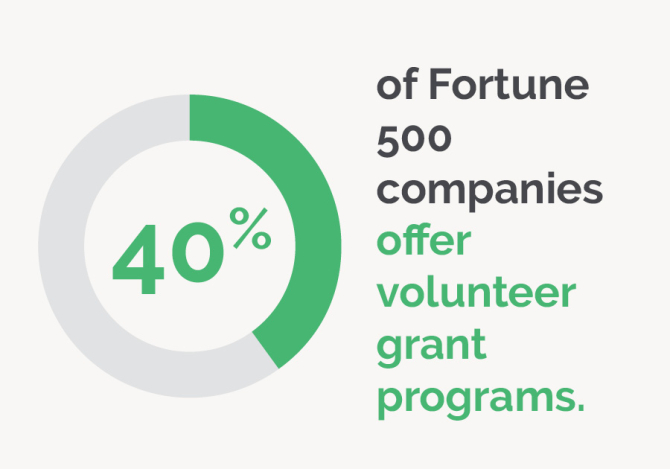
The companies with the most successful matching gift and volunteer grant programs use corporate giving software. This type of platform allows businesses to manage components of their corporate giving programs, including:
- Employee donations
- Automatic payroll deductions
- Matching gift requests
- Volunteer hour logs
- Volunteer grant requests
- Team volunteer opportunities
- Company corporate giving metrics
With all of their corporate giving information in one central location, companies can more easily communicate with their employees about their philanthropy programs and ensure donation request forms are completed in a timely manner.
4. 78% of donors are unaware if their company offers a matching gift program.
It’s difficult to make a large impact with your matching gift program if your employees don’t know about it. That’s why it’s so important to include matching gift guidelines in your corporate giving policy and promote matching gift opportunities to your team.
On the other hand, even knowing that your company’s matching gift policy exists doesn’t guarantee that supporters will participate. In fact, 16% of donors know their company offers matching gifts, but they’re not sure if they’re eligible or how to submit a request. Companies can make the matching gift process easier by leveraging corporate giving software.
Keep in mind that businesses like yours aren’t the only ones using corporate giving software. Nonprofits also use this technology to encourage matching gifts and volunteer grants among their supporters, which will overlap with your employees. Many nonprofits embed corporate giving database tools within their donation pages that allow donors to search for their employer, determine their eligibility, and submit a matching gift or volunteer grant request.
When your company’s corporate giving software integrates with nonprofit platforms, the nonprofit software will seamlessly send matching gift and volunteer grant requests to your system. Plus, software that specifically integrates with auto-submission tools can make it even simpler for your employers to get their gifts matched. Check out this video for an in-depth look at how auto-submission works:
Typical nonprofit corporate giving software enables donors to fill out their information and send matching gift and volunteer grant requests to their employers. With auto-submission, the process is even easier. All employees have to do is input their corporate email address, and the platform will send their employer the appropriate request on their behalf.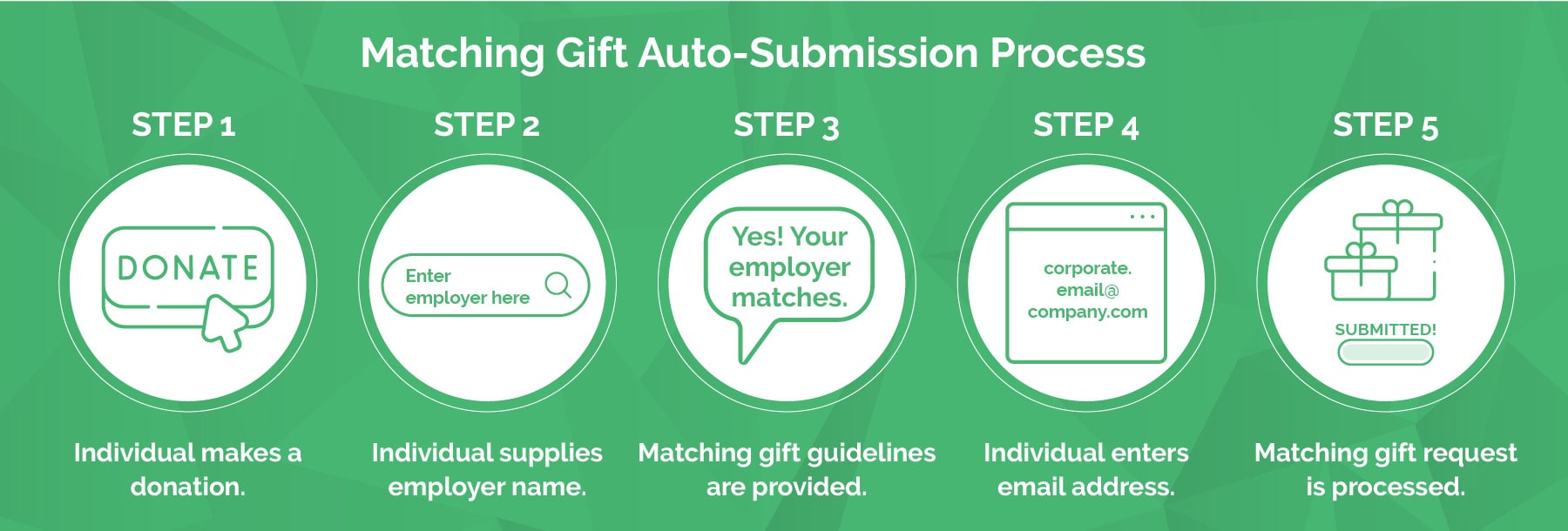
This approach ensures that more donors send matching gift and volunteer grant requests, increasing corporate giving participation and employee engagement. When choosing corporate giving software, look for a platform that integrates with those that have auto-submission capabilities, such as 360MatchPro, for best results.
5. 96% of companies find that employees who volunteer are more engaged than their coworkers who don’t.
In addition to benefiting those in need, volunteering can also improve employee engagement. When you organize volunteer shifts for your employees, you give them the opportunity to build valuable teamwork skills. Additionally, employees who work for companies that provide volunteer grants and facilitate volunteer outings feel empowered by their employer to make a difference.
Corporate volunteer programs give employees a hands-on opportunity to get involved in CSR. They’ll feel more invested in your company when they can directly contribute to your social good efforts, leading to higher engagement in the workplace.
6. 88% of Millennials find their jobs more fulfilling when their employers provide CSR opportunities.
With Millennials making up 39.4% of the workforce, it’s important to tailor your company culture to this large segment of working professionals. An overwhelming majority of Millennials believe CSR opportunities enhance their roles.
For many corporate employees, their job descriptions don’t necessarily include helping communities in a direct way, but most people feel best about themselves when they’re making a positive impact on others. CSR opportunities help close this gap.
Employees who give to their favorite causes or volunteer with nonprofits through their companies’ corporate giving programs feel a greater connection to the business. CSR makes jobs more than just jobs; these types of initiatives empower people to work with their employers for the betterment of society.
7. 55% of employees say they would take a lower salary to work for a socially responsible company.
Many employees feel so passionate about CSR that they would rather work for a socially responsible business than make a larger salary at a company that doesn’t prioritize CSR. This data is striking because it shows that companies in the midst of recruiting and hiring can entice applicants with their CSR initiatives.
While people certainly want to be paid in accordance with their skills and experience, there’s a growing sentiment that job fulfillment is sometimes more important than salary. As evidenced by the two previous CSR statistics, CSR programs enhance the employee experience and make people feel connected to their workplace.
Companies that want to attract purpose-driven applicants should take the time to develop comprehensive CSR programs. That way, they can demonstrate their commitment to social good and encourage prospective employees to join in.
8. 89% of corporate executives think employees are more satisfied when their company has a strong sense of purpose.
Not only do employees report that they prefer companies with a social conscience, but corporate executives also notice a difference in employee attitudes when companies are driven by CSR. Leadership teams recognize that CSR gives employees something to work toward in addition to their career goals and aspirations.
When employees feel satisfied in their roles, they’re more likely to put their best foot forward in the workplace. As a result, employees will be more productive and invested in their work, resulting in better outcomes for your business objectives.
9. 58% of companies say workplace giving programs are important in retaining employees.
One of the biggest challenges of running a business is retaining employees. Over the long run, it’s much more cost-effective to retain employees than hire new ones. Additionally, keeping the same employees around allows you to leverage their expertise and knowledge of the company to drive your goals forward.
That’s why when companies find an employee retention method that works, they stick with it. Since workplace giving programs make employees feel more fulfilled and engaged at work, they also help ensure employees stay with their current employers. Consequently, employees who participate in corporate giving have 75% longer tenures in the workplace.
10. 77% of consumers want to purchase from companies with CSR initiatives.
Your employees aren’t the only ones invested in your CSR program. CSR is becoming increasingly important to consumers, so much so that it’s influencing their purchasing decisions.
This figure indicates the potential positive financial impact of adopting CSR practices. To ensure customers know about the work your company does to better society, make sure to advertise different elements of your CSR program using a variety of platforms. Here are some examples of how you can promote your charitable efforts:
- Posting pictures of your corporate volunteers on social media
- Including how much your company donates to different causes each year on your product packaging
- Updating your customers on your current CSR projects through your newsletter
While CSR may not directly influence sales, it can reveal your core values to consumers who feel inclined to support charitable businesses.
11. 73% of investors look to invest in companies that improve the environment and society as a whole.
Investors have the potential to skyrocket your company to success. These days, investors are not only looking for companies with high profitability but also those that are making a positive impact on the world around them.
Implementing CSR efforts and reporting on them can increase the likelihood that purpose-driven investors support your business. Be sure to research potential investors ahead of time and include information about your CSR program in your pitches, especially for investors who have shown a demonstrated interest in CSR.
12. 96% of G250 companies report on their sustainability efforts.
In its Survey of Sustainability Reporting, KPMG explains that G250 comprises the world’s 250 largest companies by revenue. Considering nearly all of them report on their sustainability efforts, we suggest your business does the same.
Reporting on your CSR efforts, such as sustainability initiatives, increases transparency with stakeholders, including employees, consumers, and investors. When you’re compiling your annual report, you may notice gaps in your CSR strategy that you can address with your team. That way, you can ensure your strategy is comprehensive and represents your company’s commitment to its values and specific CSR interests.
13. 87% of global investors accuse companies of “greenwashing” their sustainability reports.
When reporting on your CSR efforts, especially those that pertain to sustainability, it’s important to clearly describe the specific initiatives your company has carried out. It’s easy for companies to say they’re committed to sustainability without clarifying which components of sustainability they’re targeting and the actions they’re taking to do so. This practice is called greenwashing and leads to distrust among investors and the public.
Participants in PWC’s Global Investor Survey propose that companies who are serious about sustainability should structure their sustainability reports like financial statements with reasonable assurance. That way, companies can demonstrate the specific actions they’ve taken to promote sustainability and differentiate themselves from businesses that partake in greenwashing.
14. 76% of companies use CSR reports to enhance their reputation.
After learning about the positive impact of CSR on employees, consumers, and investors, it should make perfect sense that many companies report their CSR efforts to boost brand reputation. More than anything else, a company’s CSR program illustrates that it cares about its stakeholders’ priorities and uses its power and profits to help those in need.
For accurate, data-based reporting, start by pulling relevant data from your corporate giving software. Your platform likely keeps track of metrics such as how much money your company has raised and how many employees have participated in your CSR efforts. You can also use this data to evaluate which elements of your CSR program are most successful and which need to be revamped.
Then, you can obtain qualitative data for your reports by surveying stakeholders and nonprofits you’ve worked with. For example, you may interview an avid employee about their experiences as a volunteer and speak with a representative from your nonprofit partner to learn about the impact your CSR efforts have had on their mission. These types of testimonials can provide authenticity to your CSR reports.
15. The top 10 corporations alone donate $2 billion annually to nonprofits.
This CSR statistic quantifies the substantial impact CSR has on charitable organizations. Ultimately, your company’s CSR initiatives can provide much-needed revenue to nonprofits that can use those funds to better assist their beneficiaries.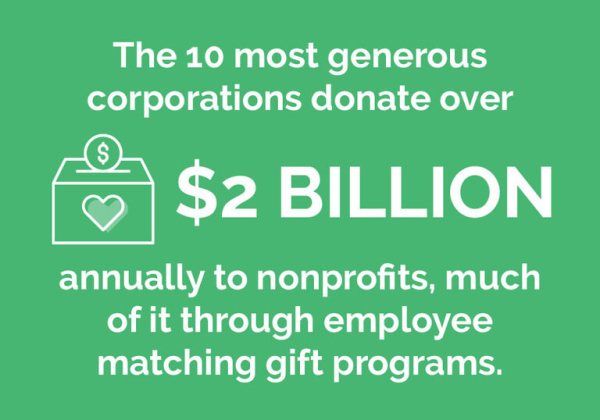
Find nonprofit partners that align with your company’s core values and mission. For example, companies that sell food products may partner with an organization that fights hunger. That way, your CSR efforts will be more meaningful and authentic to your business.
16. 94% of major US corporations plan to increase or maintain their corporate giving over the next few years.
CSR is not slowing down anytime soon. The majority of companies are growing their corporate giving programs to support even more causes and communities.
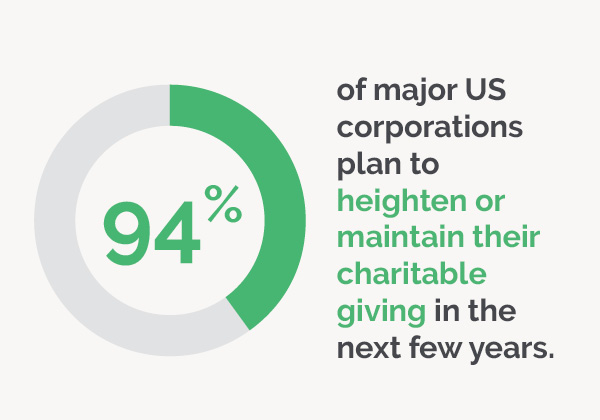
This data point indicates that CSR is not just a trend. It’s now a given for companies that want to stay relevant and positively perceived in the eyes of all stakeholders.
Additional Resources
Whether you’re looking to engage your employees, “wow” your consumers, win over stakeholders, or make a tangible difference in the community, CSR can help you achieve your goals. By contributing to nonprofit causes, you also satisfy your stakeholders and improve your brand image as a philanthropic company.
We hope these CSR statistics helped you better understand the trends and impact of CSR. For more informative statistics, check out the resources below:
- Corporate Giving and Matching Gift Statistics [Updated 2023]. Want to learn more about the ins and outs of corporate giving and matching gifts, two important components of CSR? Check out our list of relevant statistics.
- What’s the Impact of CSR? FAQ & Key Benefits for Businesses. While we covered the basics, there’s always more to learn about CSR. This article will answer your remaining CSR questions and includes additional CSR statistics.
- Choosing the Best CSR Software: A Guide for Smart Businesses. CSR software can help you organize your CSR efforts. In this guide, you’ll learn how to select the best CSR platform and absorb some more helpful CSR statistics along the way.



